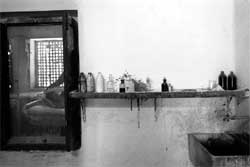Hollow men and ailing systems
 Arvind lal of Delhi's Lal Path Labs has been in the pathological diagnostics business for the past three decades. "Prescriptions instruct what tests should be conducted. If a pathogen is absent, we do not report the presence of another. So, many diseases remain undiagnosed, though they can be easily identified,' says Lal. "Twenty per cent of the cases that we receive remained undiagnosed and are presumed to be fevers of unknown origin,' says J N Pande, head of medicine at the All India Institute of Medical Sciences, New Delhi.
Arvind lal of Delhi's Lal Path Labs has been in the pathological diagnostics business for the past three decades. "Prescriptions instruct what tests should be conducted. If a pathogen is absent, we do not report the presence of another. So, many diseases remain undiagnosed, though they can be easily identified,' says Lal. "Twenty per cent of the cases that we receive remained undiagnosed and are presumed to be fevers of unknown origin,' says J N Pande, head of medicine at the All India Institute of Medical Sciences, New Delhi.
Most doctors in India do not believe that there are unknown pathogens that cause these fevers. "There is nothing like an unknown or a mystery fever, they just remain undiagnosed,' contends B K Ram, G T B Hospital, New Delhi. "Fevers are symptoms that are meant to be treated with a variety of antibiotics. Only serious infections such as meningitis call for pathological tests,' says Ram. "When we fail to control a fever, we prescribe medication for malaria or tuberculosis depending on the symptoms,' says A K Singh, deputy superintendent, Patna Medical College Hospital, and claims, "this is the World Health Organisation (who) protocol for tropical countries.'
Trial and error
Warding off the threat of an epidemic by using a broad spectrum of antibiotics may appear to be a potent option. But the risks attendant on this course of action are many. For one, it is probable that the medication will suppress the symptom without treating the condition. Another alarming possibility is that it may induce resistance in the pathogen even before it is identified. Hard-pressed for time as they are in view of the large number and heterogeneity of their patients, doctors too do not anticipate mysterious fevers.
Most experts aver that identification of pathogens is quite elementary. But complications arise because diseases go unreported at the grassroots level. "They remain unidentified because samples are collected without considering where the pathogen is likely to exist,' says K K Datta, director, National Institute of Communicable Diseases (nicd). If the disease is not reported, it does not find mention in the documents published by the institutes, thus remaining a mystery. nicd, which
